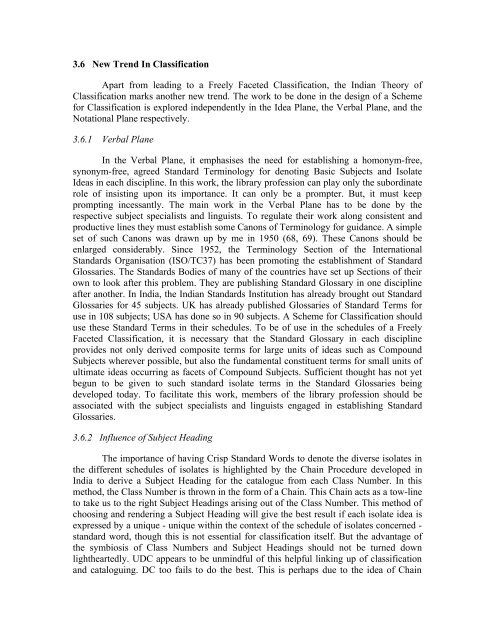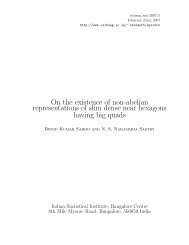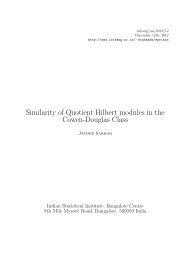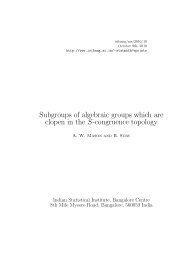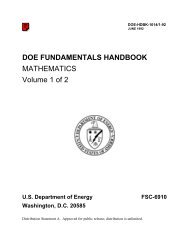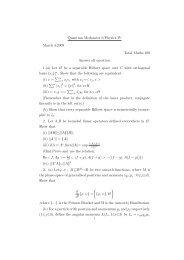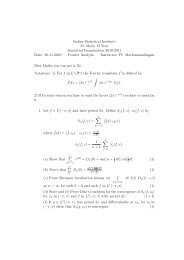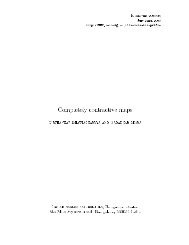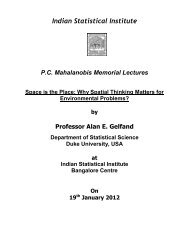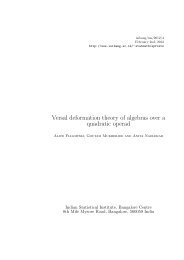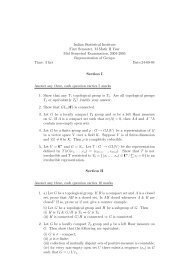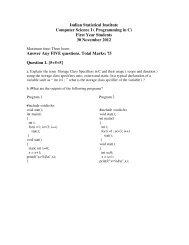CHOICE OF SCHEME FOR CLASSIFICATION - Indian Statistical ...
CHOICE OF SCHEME FOR CLASSIFICATION - Indian Statistical ...
CHOICE OF SCHEME FOR CLASSIFICATION - Indian Statistical ...
You also want an ePaper? Increase the reach of your titles
YUMPU automatically turns print PDFs into web optimized ePapers that Google loves.
3.6 New Trend In Classification<br />
Apart from leading to a Freely Faceted Classification, the <strong>Indian</strong> Theory of<br />
Classification marks another new trend. The work to be done in the design of a Scheme<br />
for Classification is explored independently in the Idea Plane, the Verbal Plane, and the<br />
Notational Plane respectively.<br />
3.6.1 Verbal Plane<br />
In the Verbal Plane, it emphasises the need for establishing a homonym-free,<br />
synonym-free, agreed Standard Terminology for denoting Basic Subjects and Isolate<br />
Ideas in each discipline. In this work, the library profession can play only the subordinate<br />
role of insisting upon its importance. It can only be a prompter. But, it must keep<br />
prompting incessantly. The main work in the Verbal Plane has to be done by the<br />
respective subject specialists and linguists. To regulate their work along consistent and<br />
productive lines they must establish some Canons of Terminology for guidance. A simple<br />
set of such Canons was drawn up by me in 1950 (68, 69). These Canons should be<br />
enlarged considerably. Since 1952, the Terminology Section of the International<br />
Standards Organisation (ISO/TC37) has been promoting the establishment of Standard<br />
Glossaries. The Standards Bodies of many of the countries have set up Sections of their<br />
own to look after this problem. They are publishing Standard Glossary in one discipline<br />
after another. In India, the <strong>Indian</strong> Standards Institution has already brought out Standard<br />
Glossaries for 45 subjects. UK has already published Glossaries of Standard Terms for<br />
use in 108 subjects; USA has done so in 90 subjects. A Scheme for Classification should<br />
use these Standard Terms in their schedules. To be of use in the schedules of a Freely<br />
Faceted Classification, it is necessary that the Standard Glossary in each discipline<br />
provides not only derived composite terms for large units of ideas such as Compound<br />
Subjects wherever possible, but also the fundamental constituent terms for small units of<br />
ultimate ideas occurring as facets of Compound Subjects. Sufficient thought has not yet<br />
begun to be given to such standard isolate terms in the Standard Glossaries being<br />
developed today. To facilitate this work, members of the library profession should be<br />
associated with the subject specialists and linguists engaged in establishing Standard<br />
Glossaries.<br />
3.6.2 Influence of Subject Heading<br />
The importance of having Crisp Standard Words to denote the diverse isolates in<br />
the different schedules of isolates is highlighted by the Chain Procedure developed in<br />
India to derive a Subject Heading for the catalogue from each Class Number. In this<br />
method, the Class Number is thrown in the form of a Chain. This Chain acts as a tow-line<br />
to take us to the right Subject Headings arising out of the Class Number. This method of<br />
choosing and rendering a Subject Heading will give the best result if each isolate idea is<br />
expressed by a unique - unique within the context of the schedule of isolates concerned -<br />
standard word, though this is not essential for classification itself. But the advantage of<br />
the symbiosis of Class Numbers and Subject Headings should not be turned down<br />
lightheartedly. UDC appears to be unmindful of this helpful linking up of classification<br />
and cataloguing. DC too fails to do the best. This is perhaps due to the idea of Chain


